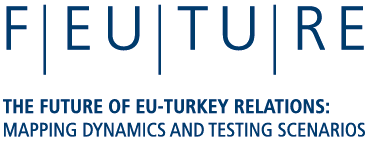Work Package 2 - Political Drivers
This Work Package identified key political drivers in EU-Turkey relations and has been developed in close cooperation with the WP on security drivers, led by EDAM and a multilevel approach was used: drivers from Turkey, from the EU, from their shared neighbourhood and at the global level will be analysed.
The WP identified the circumstances under which political changes in all those levels have shaped EU-Turkey relations, and could continue to do so in the future. The WP explored which political drivers are likely to lead to the realisation of one of the three ideal-type scenarios: conflict, cooperation or convergence in EU-Turkey relations.
For instance, when looking at political drivers emanating from Turkey, the research team focused on whether the consolidation of AKP in power, the different pace in approving and implementing politically sensitive reforms, the reaction to the Gezi protests or the measures taken since the failed coup attempt altered the parameters of EU-Turkey relations and in which direction.
At the EU level, the analysis looked at the effects of changing institutional structure, the effects of the 2004 enlargement and Brexit. However, not only the EU as a whole mattered but also some member states with a strong say in the EU, in general, or regarding Turkey in particular. Not only the effects of changes of ruling parties in those key capitals were analysed, but also pan-European developments such as the political impacts of the economic recession and the rising concerns of Eurosceptic rhetoric.
Regarding the shared neighbourhood the research focused on the Black Sea, the Caucasus and the Middle East and North Africa. Did the Colour Revolutions, the Arab Uprisings or the neo-authoritarian trends in both regions push Turkey and the EU closer? And if so, did it have an impact on the way they look at the prospects of Turkey becoming a member of the EU?
At the global level, EU-Turkey relations were analysed in light of trends such as intensifying tendencies towards nationalism, xenophobia, isolationism, emergence of populist movements and a major power shift in global powers. For instance, does the rise of non-Western global powers or political changes in the US affect EU-Turkey relations in a significant manner?
In the last eighteen months the institutions involved in this endeavour (CIDOB, AUC, CIFE, CRRC, DIIS and EDAM) shed some light on these questions and identified the most likely scenario for EU-Turkey relations within the political arena.
Papers:
It Takes Two to Tango: Political changes in Europe and their Impact on Turkey's EU bid by Eduard Soler i Lecha, Funda Tekin, Melike Janine Sökmen (April 2018)
Political Changes in Turkey and the Future of Turkey-EU Relations: From Convergence to Conflict? by Atila Eralp, Asuman Göksel, Jakob Lindgaard (Dezember 2017)
Politics and Turkey-EU Relations: Drivers from the Southern and Eastern Neighbourhoods by Benett Clifford, Dustin Gilbreath, Justine Louis (December 2017)
EU-Turkey Relations in the Midst of a Global Storm by Pol Morillas, Melike Janine Sökmen, Akin Ünver (November 2017)
Researchers involved:
| Barcelona Centre for International Affairs | Eduard Soler i Lecha (WP leader), Pol Morillas |
| Centre international de formation européenne | Funda Tekin |
American University in Cairo | Marco Pinfari |
| Caucasus Research Resource Center Georgia | Dustin Gilbreath, Koba Turmanidze, Mariam Kobaladze, Mariam Sikharulidze |
| Danish Institute for International Studies | Cecile Banke, Jakob Lindgaard |
| Centre for Economics and Foreign Policy Studies | Ahmet Kasim Han, Beken Saatcioglu, Yesil Deniz |
| Middle East Technical University | Atila Eralp, Asuman Göksel, Özgehan Senyuva, Zerrin Torun |
